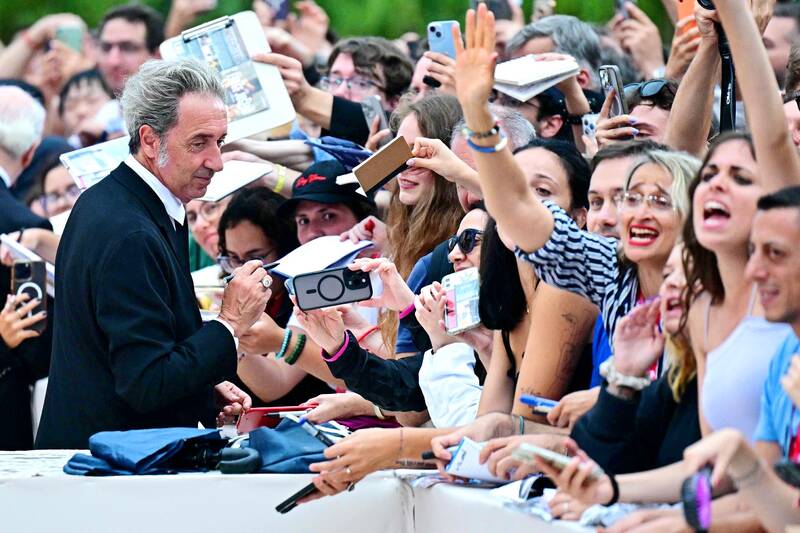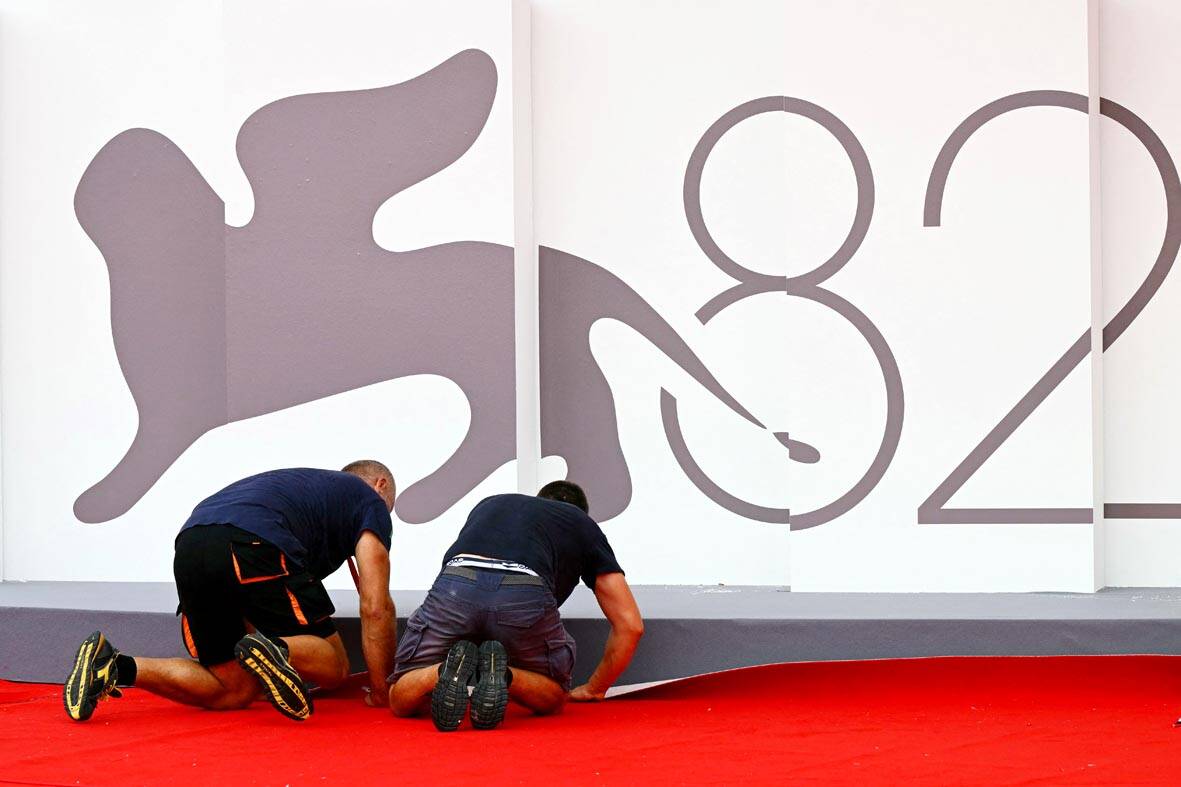The Venice Film Festival kicked off with the world premiere of Paolo Sorrentino’s La Grazia Wednesday night on the Lido. The opening ceremony of the festival also saw Francis Ford Coppola presenting filmmaker Werner Herzog with a lifetime achievement prize.
The 82nd edition of the glamorous international film festival is playing host to many Hollywood stars, including George Clooney, Julia Roberts and Dwayne Johnson, and famed auteurs, from Guillermo del Toro to Kathryn Bigelow, who all have films debuting over the next 10 days. The conflict in Gaza has also already been an everpresent topic both outside the festival’s walls, where protesters gathered, and during the news conferences.
The festival, which takes place on the Lido, chose to open with the newest film from one of Italy’s most revered working filmmakers. La Grazia stars Sorrentino’s longtime collaborator Toni Servillo as a fictional Italian president who is paralyzed by indecision near the end of his term, grappling with signing a bill that allows euthanasia and mourning his late wife.

Photo: AFP
Sorrentino said that he was inspired to write the film by a real case of an Italian president who pardoned a man that had killed his wife, who was suffering from Alzheimer’s. The title of the film, can be translated to “the pardon” in English, he said.
“This was a moral dilemma that was interesting to tell,” Sorrentino said. “I have thought for years that moral dilemmas are very interesting for storytelling.”
Venice Film Festival director Alberto Barbera said that La Grazia took them by surprise.

Photo: AFP
“It’s a different Sorrentino from what we are used to,” Barbera said. “Far less baroque and formalistic than the previous films he made. It’s a very unexpected story.”
Sorrentino, best known for his Oscar-winning film The Great Beauty, made his debut at the Venice Film Festival 24 years ago with the film One Man Up. He also won the Silver Lion prize in 2021 for The Hand of God, which went on to be nominated for an Oscar. Many films that premiere at Venice go on to Oscar nominations and wins.
La Grazia is one of the 21 films playing in the festival’s main competition. Other titles vying for the prestigious Golden Lion prize include del Toro’s Frankenstein, Bigelow’s A House of Dynamite, Yorgos Lanthimos’s Bugonia, Benny Safdie’s The Smashing Machine and Kaouther Ben Hania’s The Voice of Hind Rajab.

Photo: AFP
Winners are decided on by a jury of international filmmakers and actors, including Sideways director Alexander Payne and Brazilian actor Fernanda Torres. Payne, who is president of this year’s jury, said he arrived to Venice yesterday and was soon seated next to Francis Ford Coppola watching a restoration of a 1920s silent film.
“I thought, ‘I’m in heaven,” Payne said. “This is heaven.”
GAZA
News about the real world has also been top of mind at the festival, where steps away from the main headquarters, anti-war protesters gathered earlier Wednesday to turn the spotlight to Gaza. A march is also planned for Saturday evening.
Martina Vergnano, an activist with the Social Centers of the Northeast, one of the protest organizers, said hundreds of associations, social centers and film festival participants had signed onto the petition to participate in the protest Saturday. Vergnano spoke in front of the red carpet alongside about a dozen protesters flying Palestinian flags and holding a banner that read: “Free Palestine, Stop the Genocide” with the time and date of Saturday’s protest.
There have been calls to disinvite actors like Gal Gadot and Gerard Butler from attending the festival for their views, but Barbera said that the festival does not boycott artists, nor does it make political statements.
Sorrentino, who recently called the situation in Gaza a “genocide” was asked about Mubi, the company that is distributing his film. Mubi, the indie film shop behind last year’s The Substance, has come under scrutiny because of funder Sequoia Capital’s ties to the Israeli military. The filmmaker redirected the floor to “somebody from Mubi,” who declined to speak. A moderator redirected the conversation back to the film.
Payne also faced questions Wednesday afternoon about the conflict and Hollywood’s responsibility to address it.
“I feel a little bit unprepared for that question,” Payne said. “I’m here to judge and talk about cinema.”
The festival runs through Sept. 6.

The Lee (李) family migrated to Taiwan in trickles many decades ago. Born in Myanmar, they are ethnically Chinese and their first language is Yunnanese, from China’s Yunnan Province. Today, they run a cozy little restaurant in Taipei’s student stomping ground, near National Taiwan University (NTU), serving up a daily pre-selected menu that pays homage to their blended Yunnan-Burmese heritage, where lemongrass and curry leaves sit beside century egg and pickled woodear mushrooms. Wu Yun (巫雲) is more akin to a family home that has set up tables and chairs and welcomed strangers to cozy up and share a meal

Dec. 8 to Dec. 14 Chang-Lee Te-ho (張李德和) had her father’s words etched into stone as her personal motto: “Even as a woman, you should master at least one art.” She went on to excel in seven — classical poetry, lyrical poetry, calligraphy, painting, music, chess and embroidery — and was also a respected educator, charity organizer and provincial assemblywoman. Among her many monikers was “Poetry Mother” (詩媽). While her father Lee Chao-yuan’s (李昭元) phrasing reflected the social norms of the 1890s, it was relatively progressive for the time. He personally taught Chang-Lee the Chinese classics until she entered public

Last week writer Wei Lingling (魏玲靈) unloaded a remarkably conventional pro-China column in the Wall Street Journal (“From Bush’s Rebuke to Trump’s Whisper: Navigating a Geopolitical Flashpoint,” Dec 2, 2025). Wei alleged that in a phone call, US President Donald Trump advised Japanese Prime Minister Sanae Takaichi not to provoke the People’s Republic of China (PRC) over Taiwan. Wei’s claim was categorically denied by Japanese government sources. Trump’s call to Takaichi, Wei said, was just like the moment in 2003 when former US president George Bush stood next to former Chinese premier Wen Jia-bao (溫家寶) and criticized former president Chen

President William Lai (賴清德) has proposed a NT$1.25 trillion (US$40 billion) special eight-year budget that intends to bolster Taiwan’s national defense, with a “T-Dome” plan to create “an unassailable Taiwan, safeguarded by innovation and technology” as its centerpiece. This is an interesting test for the Chinese Nationalist Party (KMT), and how they handle it will likely provide some answers as to where the party currently stands. Naturally, the Lai administration and his Democratic Progressive Party (DPP) are for it, as are the Americans. The Chinese Communist Party (CCP) is not. The interests and agendas of those three are clear, but